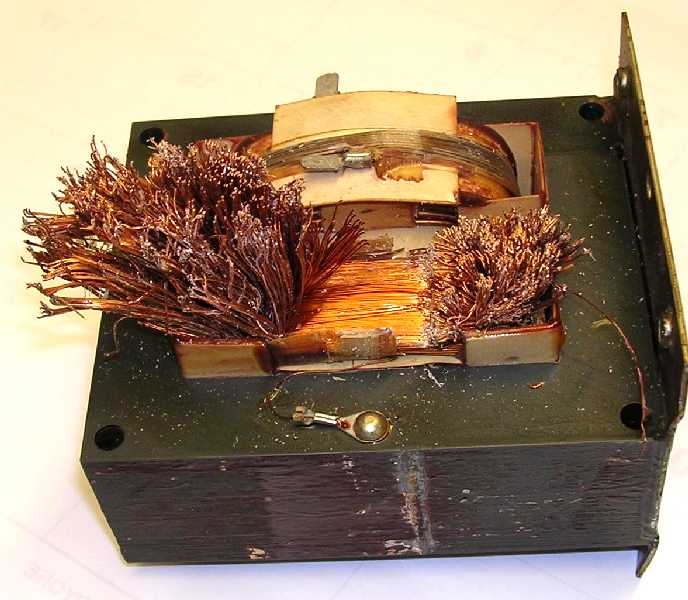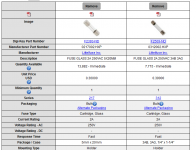Charles, you might consider installing an IEC power inlet with integrated fuse holder and RFI filter. DigiKey and Mouser sell tons of different models, with lots of different current ratings and connector options. Here's a DigiKey link.
Many of them accept the smaller 5 x 20 size fuses, which have slightly less resistance as a previous poster mentioned.
Many of them accept the smaller 5 x 20 size fuses, which have slightly less resistance as a previous poster mentioned.
Medical grade (no Y caps) might be worth a try.Charles, you might consider installing an IEC power inlet with integrated fuse holder and RFI filter. DigiKey and Mouser sell tons of different models, with lots of different current ratings and connector options. Here's a DigiKey link.
Many of them accept the smaller 5 x 20 size fuses, which have slightly less resistance as a previous poster mentioned.
Dan.
Acme Audio Labs! Here I thought this was gonna be a fun parody site a la Wile E. Coyote, but... no. Just the usual nonsense.
So: Silver plating + mains voltage + substantial current flow = how much voltage drop (i.e. heat) produced when all this pretty silver begins to tarnish? Sounds like a novel method for burning your house down. I notice no mention of UL or other approval of any of this stuff.
Sheesh.
-- Jim
So: Silver plating + mains voltage + substantial current flow = how much voltage drop (i.e. heat) produced when all this pretty silver begins to tarnish? Sounds like a novel method for burning your house down. I notice no mention of UL or other approval of any of this stuff.
Sheesh.
-- Jim
.... the smaller 5 x 20 size fuses, which have slightly less resistance as a previous poster mentioned.
Is that correct? The resistance determines the fuse rating through I(squared)R, so a particular fuse rating determines the resistance, not the physical shape, right?
Jan
I would expect the resistance per unit length (heat radiation area) to be the set point for a fuse wire.
A very long wire will proportionally lose less heat to the end connections, whereas a short fuse wire wll proportionally lose more heat to the end connections.
Thus I would expect a short fuse wire to run a bit cooler, than a very long fuse wire.
This may result in the same fuse wire having a different fuse rating depending on it's length.
Clearly a short fuse wire has less cold resistance than a long fuse wire when it too is cold.
When operating as a warmed up fuse wire, the longer wire running a bit hotter than the shorter one will have a bigger increase in resistance than the short wire.
As I see it the long fuse wire has more cold resistance and it will have a slightly higher increase in resistance than an identical short fuse wire.
A very long wire will proportionally lose less heat to the end connections, whereas a short fuse wire wll proportionally lose more heat to the end connections.
Thus I would expect a short fuse wire to run a bit cooler, than a very long fuse wire.
This may result in the same fuse wire having a different fuse rating depending on it's length.
Clearly a short fuse wire has less cold resistance than a long fuse wire when it too is cold.
When operating as a warmed up fuse wire, the longer wire running a bit hotter than the shorter one will have a bigger increase in resistance than the short wire.
As I see it the long fuse wire has more cold resistance and it will have a slightly higher increase in resistance than an identical short fuse wire.
Didn't think to do a search at Digikey or Mouser for 30A holders. Now have much to chew on.
And, you're right Jon; "silly me" for actually experiencing differences - multiple times even. Must have been the phase of the moon.
Charles
Instead of answering like that i would suggest you look at perception and how easily it can be fooled, and the chances are you are fooling yourself, many of us have been there and one started doing more controlled listening found the differences were not there any more....
Is that correct? The resistance determines the fuse rating through I(squared)R, so a particular fuse rating determines the resistance, not the physical shape, right?
Hi Jan, I hope it is safe to trust manufacturer's datasheets; maybe it's even safer to be skeptical and only trust one's own measurements.
But if we do decide to trust manufacturer's datasheets, then the stated "cold resistance" for a 2 amp, 250V, 5x20 fuse is different than the stated cold resistance for a 2 amp, 250V, 1/4" x 1 1/4" 3AG fuse ... from the same manufacturer. One of them is 1.69x the resistance of the other.
Here are the two fuses whose datasheets I read, to extract the "cold resistance" numbers. Anybody could do the same; it takes no special skill or insight to look up a couple numbers in a couple datasheets. Other DIYers may wish to perform the same pair of lookups for other fuse manufacturers, such as Eaton / Cooper-Bussmann. It isn't difficult.
_
Attachments
stellavox
My advice to you is to keep from posting "audiophile" threads on this forum. You see, people with degrees seem to "know it all".
I'm pretty much tired of such conversations and don't wish to create another debate. What I'm suggesting to you is to ask the same question on the audioasylum/audiogon forums. They will help you much better.
As for me, I went on the cheap side. My power switch has a fuse bypassing position.
Guess what, I always listen my music on the bypass mode. Sadly, the fuse with the holder kills so much of the microdetails that it's unbearable.
Regards,
Alexander.
My advice to you is to keep from posting "audiophile" threads on this forum. You see, people with degrees seem to "know it all".
I'm pretty much tired of such conversations and don't wish to create another debate. What I'm suggesting to you is to ask the same question on the audioasylum/audiogon forums. They will help you much better.
As for me, I went on the cheap side. My power switch has a fuse bypassing position.
Guess what, I always listen my music on the bypass mode. Sadly, the fuse with the holder kills so much of the microdetails that it's unbearable.
Regards,
Alexander.
THAT'S A GOOD ONE!! Headline: FUSE HOLDER KILLS MICRODETAILS IN COLD BLOOD!!!stellavoxMy advice to you is to keep from posting "audiophile" threads on this forum. You see, people with degrees seem to "know it all". I'm pretty much tired of such conversations and don't wish to create another debate. My power switch has a fuse bypassing position.
Guess what, I always listen my music on the bypass mode. Sadly, the fuse with the holder kills so much of the microdetails that it's unbearable.
Regards,Alexander.
stellavox
As for me, I went on the cheap side. My power switch has a fuse bypassing position.
Guess what, I always listen my music on the bypass mode.
wait so the amp designer thought defeating a safety device was a good idea,
what kind of switch did you use? Did it occur that most switches are mechanically / electrically much worse than a fuse. I'm guessing you prefer to drive in cars without seatbelts and airbags.
Sounds nice 😉Headline: FUSE HOLDER KILLS MICRODETAILS IN COLD BLOOD!!!
Of course.wait so the amp designer thought defeating a safety device was a good idea
Why not? 😛I'm guessing you prefer to drive in cars without seatbelts and airbags.
If you don't want to have a "weak link" in the power supply cabling chain you're going to want to replace the power transformer as well. The cable from the fuse goes into there next and wraps around the steel core hundreds of times. There could easily be over a hundred feet of wire coiled up inside the transformer and it's all MUCH thinner wire than any of the pieces you're replacing. (don't be fooled by the colored transformer leads, the wire inside the transformer is much thinner than those) The wire you can actually see in the amp is only a tiny, insignificant percentage of the total length of wire the power has to pass through. >90% of the wire is inside the transformer.
Somebody cut into this one:

Somebody cut into this one:

Last edited:
stellavox
My advice to you is to keep from posting "audiophile" threads on this forum. You see, people with degrees seem to "know it all".
I'm pretty much tired of such conversations and don't wish to create another debate. What I'm suggesting to you is to ask the same question on the audioasylum/audiogon forums. They will help you much better.
As for me, I went on the cheap side. My power switch has a fuse bypassing position.
Guess what, I always listen my music on the bypass mode. Sadly, the fuse with the holder kills so much of the microdetails that it's unbearable.
Regards,
Alexander.
Yes its best to join a site where your beliefs wont be questioned, then you can continue fooling yourself.....
Yes its best to join a site where your beliefs wont be questioned, then you can continue fooling yourself.....
Seconded ... it doesn't take a degree to question the wisdom of bypassing a device designed to prevent death and/or damage .
Somebody cut into this one:

No, you completely misunderstood... this transformer has been tweaked to optimize the "air in the reproduced sound"... 😉
Some tweaks are reversible. That allows repeated comparison.......
Is this tweak reversible?
Educated people know stuff; who would have thought it?50AE said:You see, people with degrees seem to "know it all".
I'm pretty much tired of such conversations and don't wish to create another debate.
Why buy an amp designed by someone who is ignorant?My power switch has a fuse bypassing position.
I'm sure a good neurosurgeon could have a go at reversing that 'tweak'.AndrewT said:Is this tweak reversible?
- Status
- Not open for further replies.
- Home
- Member Areas
- The Lounge
- "audiophile grade" fuse holder??
